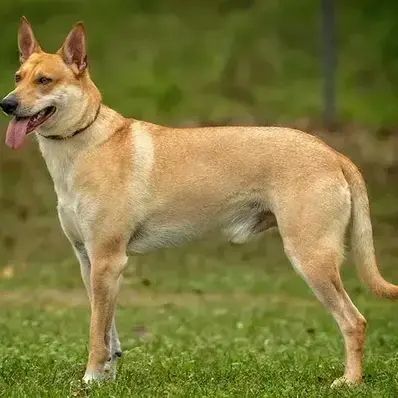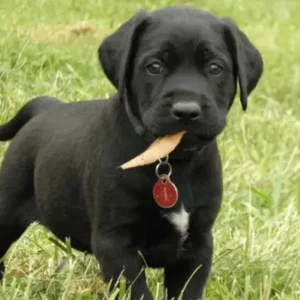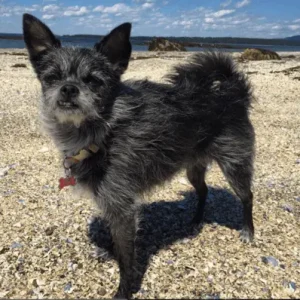Carolina Dog History/Origin
When primitive humans crossed the Bering land bridge from Asia to North America, they brought early domesticated dogs from Asian wolves. Skeletal and mummified remains of these dogs were found with Southwest Indian artifacts.
They spread to Central and South America and the eastern United States. Archaeologists discovered similar remains in southeastern forests, showing their companionship with Native Americans long before Europeans arrived.
Carolina History- Source: AKC.org
Recent studies of free-ranging dogs in the Southeast and Southwest suggest they descended from these early companions. Dr. I. Lehr Brisbin named these free-ranging dogs “Carolina Dogs” after encountering them in the Southeast.
The Carolina Dog, also known as the American Dingo, is a unique and ancient purebred dogs that has survived for thousands of years in the wilds of South Carolina.
Further studies support this hypothesis, but additional genetic research is needed to reach a definitive conclusion about their origins.
The free-ranging dogs noted by Dr. Brisbin resemble most Middle Eastern pariah dogs. Their behavior and general ecology also suggest a derivation from these free-ranging dogs.
Carolina Dog Personality
The Carolina Dog is not overly affectionate with kisses and cuddles but incredibly loyal and forms strong bonds with their humans. They are one of the dog breeds described as sturdy, quiet, gentle, brave, cunning, and resourceful. After living on their own for hundreds of years, they are natural hunters and can adapt to just about any climate or lifestyle.
- Temperament
The Carolina Dog is known for its loyal and independent nature, often forming strong bonds with its family. They are intelligent and alert, making them excellent watchdogs. While they can be reserved with strangers, they are typically gentle and affectionate with those they know well. Their pack mentality means they thrive in environments where they feel part of a cohesive group.
- Potential Challenges
Carolina Dogs can present challenges due to their independent streak and primitive instincts. Their strong prey drive may lead them to chase small animals if not properly trained and socialized.
Their natural wariness of strangers can also translate into shyness or aloofness if not managed early on. Additionally, their intelligence and need for mental stimulation require consistent engagement to prevent boredom and potential behavioral issues.
Carolina Dog Physical Appearance
The Carolina Dog is typically a medium-sized dog with a light to medium bone structure, resembling a small jackal or a medium-sized sighthound in appearance. It has a rectangular body shape with a straight, medium-length back.
Carolina Dog has almond-shaped eyes that come in shades of brown, amber, or yellow. The tail is notable for its fish-hook shape at the end and varies in carriage depending on the dog’s mood, often featuring a white tip.
- Size
Carolina Dogs typically weigh between 30 and 50 pounds and stand 18 to 20 inches tall at the shoulders. However, individual dogs may vary in size, sometimes deviating from the breed’s average or standard measurements.
- Coat color
The Carolina Dog’s coat comes in colors like cream, tan, black, brown, and red, often mixed. They have short, dense fur and groom themselves like cats, staying clean. Their coats change with the seasons, getting thinner in summer and thicker with a dense undercoat in winter.
Tan Carolina – Source: Pinterest
Fawn Carolina – Source: arley.carolinadog
Brown Carolina – Source: rue_n_osa_bear
Black Carolina – Source: AKC.org
Carolina Dog Gender Differences
Male and female Carolina Dogs show minimal differences in appearance, with males typically having a slightly bulkier build compared to females. Females, on the other hand, often display a more slender physique. These subtle variations in body structure do not significantly impact their overall appearance or temperament.
Carolina Dog Feed/Nutrition
Carolina Dogs thrive on a diet rich in meat, bone, offal, and a small amount of plant ingredients, similar to their natural diet. High protein is essential, whether from quality dog food or homemade meals, given once daily.
Consult your vet for portion sizes and feeding frequency to prevent weight gain, as Carolina Dogs are prone to it. Dietary needs change with age, so ongoing vet guidance is crucial due to individual variations in weight, energy, and health.
Adding cucumbers as a low-calorie snack can be a healthy treat for your dog, but make sure to serve them in moderation.
Carolina Dog Health
Carolina Dogs are generally robust and healthy due to their long history in the wild, which has spared them from many of the genetic disorders prevalent in heavily bred dog breeds today.
- Ivermectin Sensitivity: Carolina Dogs have a genetic mutation that makes them highly sensitive to ivermectin, commonly used for treating mites. This sensitivity can cause severe neurological issues if given standard doses. Caution is crucial in medication choices to avoid complications.
- Dysplasia: Carolina Dogs, like many active breeds, are prone to elbow dysplasia and hip dysplasia. This condition affects joint development and can lead to arthritis and mobility issues. Regular vet check-ups and proper care help manage and reduce the impact of dysplasia.
Carolina Dog Care and Grooming
Regular veterinary checkups are essential for your Carolina Dog to catch any health issues early. Ensure your Carolina Dog gets at least 60 minutes of daily exercise to maintain their fitness, and always provide fresh water.
Carolina Dogs are known for their cleanliness and self-grooming habits, akin to cats. However, they’ll need help with nail trimming every month or so to prevent them from becoming too long and clicking on the floor.
Consult your groomer or vet for assistance. Dental care is crucial; brush your dog’s teeth at least three times weekly. Your vet can demonstrate proper brushing techniques and recommend dental chews for added oral health.
Additionally, training your dog not to bite is essential for a safe grooming experience and positive interactions.
Carolina Dog Rescue Groups
Consider adopting a Carolina Dog breed from a rescue organization or shelter. Many groups focus on this breed, offering a chance to provide a loving home. Research local options for a good match.
Carolina Dog Price
The price of a Carolina Dog typically ranges from $500 to $1,000, depending on factors such as breeder reputation, pedigree, and location.
Carolina Dogs may occasionally be available for sale through breeders or rescue organizations. Prices can vary based on factors like lineage, health screenings, and breeder reputation. It’s important to research and choose a reputable Carolina Dog breeder who prioritizes the breed’s health and welfare. Adoption from a rescue organization is also a great option, potentially offering a loving home to a dog in need.
Interesting Facts
- Carolina Dogs are recognized in the AKC Foundation Stock Service as a domestic breed. Despite this, they can still be found in the wild. Wild populations often stay near the Georgia-South Carolina border.
- Carolina Dogs, owing to their ancestry and recent domestication, typically exhibit a strong pack mentality.
Best For
Carolina Dogs are best suited for individuals or families who have experience with dogs and understand their pack-oriented nature. They thrive with active owners who can provide ample exercise and mental stimulation. Potential owners should appreciate their independent yet loyal temperament and be willing to invest time in training and socialization.
Top Names
| Male Carolina Dogs Names | Female Carolina Dogs Names |
| Hunter | Savannah |
| Rusty | Dakota |
| Scout | Willow |
| Tucker | Luna |
| Blaze | Ginger |









 Carolina History- Source:
Carolina History- Source: 

 Tan Carolina – Source:
Tan Carolina – Source:  Fawn Carolina – Source:
Fawn Carolina – Source:  Brown Carolina – Source:
Brown Carolina – Source:  Black Carolina – Source:
Black Carolina – Source: 







